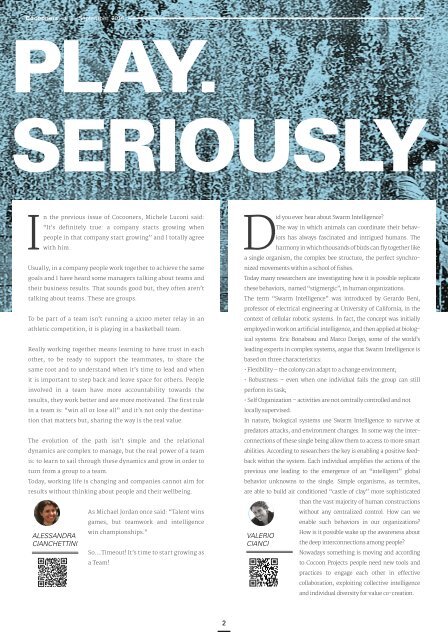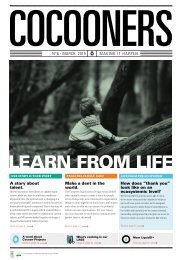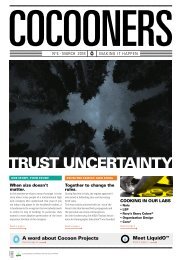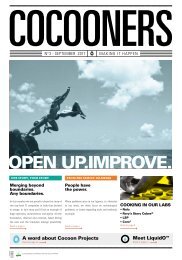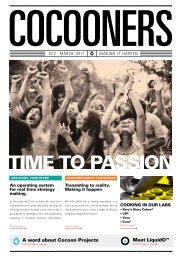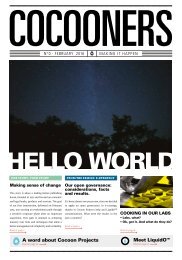COCOONERS - Making It Happen - No 1, September 2016
The digital version of our "Cocooners" half-yearly publication. Catch up about news, tools, thoughts, facts, people, work, future. Welcome to Cocooners. No 1, Sep 2016.
The digital version of our "Cocooners" half-yearly publication. Catch up about news, tools, thoughts, facts, people, work, future. Welcome to Cocooners. No 1, Sep 2016.
You also want an ePaper? Increase the reach of your titles
YUMPU automatically turns print PDFs into web optimized ePapers that Google loves.
Cocooners - n° 1 - <strong>September</strong> <strong>2016</strong><br />
Cocooners - n° 1 - <strong>September</strong> <strong>2016</strong><br />
PLAY.<br />
SERIOUSLY.<br />
In the previous issue of Cocooners, Michele Luconi said:<br />
“<strong>It</strong>’s definitely true: a company starts growing when<br />
people in that company start growing” and I totally agree<br />
with him.<br />
Usually, in a company people work together to achieve the same<br />
goals and I have heard some managers talking about teams and<br />
their business results. That sounds good but, they often aren’t<br />
talking about teams. These are groups.<br />
To be part of a team isn’t running a 4x100 meter relay in an<br />
athletic competition, it is playing in a basketball team.<br />
Really working together means learning to have trust in each<br />
other, to be ready to support the teammates, to share the<br />
same root and to understand when it’s time to lead and when<br />
CLAUDIA<br />
PELLICORI<br />
it is important to step back and leave space for others. People<br />
involved in a team have more accountability towards the<br />
results, they work better and are more motivated. The first rule<br />
in a team is: “win all or lose all” and it’s not only the destination<br />
that matters but, sharing the way is the real value.<br />
The evolution of the path isn’t simple and the relational<br />
dynamics are complex to manage, but the real power of a team<br />
is: to learn to sail through these dynamics and grow in order to<br />
turn from a group to a team.<br />
Today, working life is changing and companies cannot aim for<br />
results without thinking about people and their wellbeing.<br />
ALESSANDRA<br />
CIANCHETTINI<br />
As Michael Jordan once said: “Talent wins<br />
games, but teamwork and intelligence<br />
win championships.”<br />
So….Timeout! <strong>It</strong>’s time to start growing as<br />
a Team!<br />
Did you ever hear about Swarm Intelligence?<br />
The way in which animals can coordinate their behaviors<br />
has always fascinated and intrigued humans. The<br />
harmony in which thousands of birds can fly together like<br />
a single organism, the complex bee structure, the perfect synchronized<br />
movements within a school of fishes.<br />
Today many researchers are investigating how it is possible replicate<br />
these behaviors, named “stigmergic”, in human organizations.<br />
The term “Swarm Intelligence” was introduced by Gerardo Beni,<br />
professor of electrical engineering at University of California, in the<br />
context of cellular robotic systems. In fact, the concept was initially<br />
employed in work on artificial intelligence, and then applied at biological<br />
systems. Eric Bonabeau and Marco Dorigo, some of the world’s<br />
leading experts in complex systems, argue that Swarm Intelligence is<br />
based on three characteristics:<br />
• Flexibility – the colony can adapt to a change environment;<br />
• Robustness – even when one individual fails the group can still<br />
perform its task;<br />
• Self Organization – activities are not centrally controlled and not<br />
locally supervised.<br />
In nature, biological systems use Swarm Intelligence to survive at<br />
predators attacks, and environment changes. In some way the interconnections<br />
of these single being allow them to access to more smart<br />
abilities. According to researchers the key is enabling a positive feedback<br />
within the system. Each individual amplifies the actions of the<br />
previous one leading to the emergence of an “intelligent” global<br />
behavior unknowns to the single. Simple organisms, as termites,<br />
are able to build air conditioned “castle of clay” more sophisticated<br />
VALERIO<br />
CIANCI<br />
than the vast majority of human constructions<br />
without any centralized control. How can we<br />
enable such behaviors in our organizations?<br />
How is it possible wake up the awareness about<br />
the deep interconnections among people?<br />
<strong>No</strong>wadays something is moving and according<br />
to Cocoon Projects people need new tools and<br />
practices to engage each other in effective<br />
collaboration, exploiting collective intelligence<br />
and individual diversity for value co-creation.<br />
In the age of Disruptive Innovation, I couldn’t find any better<br />
landscape than the Chinese Market.<br />
Two years ago, arriving here I felt lost in this confused mix<br />
of different ages mashed all together, while innovation<br />
randomly explodes and culture and society trying to keep up. Then,<br />
approaching many organizations, I figured out how they were able to<br />
manage all this: continuously adapting to the context. Surprisingly,<br />
despite the enormous number of people, products and services are<br />
perfectly shaped around them.<br />
And that’s wonderful. But the deeper you dig into organizations the<br />
more you realize that often the principles they’re built on don’t take<br />
into consideration people as they should. How can a hiring process<br />
be compelling if there’s no attention to the way each individual<br />
approach may impact on the effectiveness of the team or more<br />
broadly on the organization?<br />
Are you sure I am just talking about China? Aren’t you familiar with<br />
this, wherever you come from?<br />
Everywhere the mania to control complexity converts organizations<br />
- naturally complex systems – into something just complicated.<br />
Exchanging tools with purposes twists the very idea of innovation.<br />
So you can now see a bunch of people reading books and taking<br />
certifications, but how many of them are really willing to involve<br />
their coworkers in decisional processes? Curiously, in a time where<br />
machines are already human, companies still think of coworkers in<br />
terms of executors. Confusing leadership with power raises up the<br />
gap between strategists and executors. And that’s where the black<br />
ALESSANDRA<br />
COSIMATO<br />
hole lies, where companies lose the chance to<br />
create value.<br />
COCREATION INITIATIVES<br />
10 DAYS OF PUBLIC WORKSHOPS<br />
3 CITIES<br />
130+ PARTICIPANTS<br />
FROM THE WHOLE WORLD<br />
TALKING ABOUT US<br />
IN COSA CONSISTE IL METODO<br />
LEGO ® SERIOUS PLAY ® ?<br />
If organizations can’t face this, they won’t<br />
see the Elephant with the whole Savannah in<br />
the room. So let’s rethink mindsets to change<br />
behaviors, processes, and organizational principles.<br />
This could be an innovative start.<br />
What are you afraid of? Have you ever noticed<br />
how you relate with your fears? Think about a<br />
situation that time ago got you completely nuts.<br />
Personally, I’ve got several situations where my<br />
only wish was to run away, disappear, earth-please-eat-me…But<br />
today, I can even smile thinking of how much I was scared about<br />
things, contexts and people.<br />
We are constantly in touch with Fear, often through its most<br />
daily nuances such a continued uncertainty in doing anything;<br />
Fear tends to block us and it will not disappear for itself because<br />
it’s just in our minds. We have to face it, even by small steps<br />
because it’s the only way to get a change and move ahead. When<br />
something is blocking you, find the smallest thing you can do to<br />
get a solution and start, otherwise, the risk is to get used to not<br />
act at all and always leave decisions and actions to something or<br />
someone else.<br />
Reflect on the way we deal with Fear, even when it’s present in<br />
small doses in our everyday life, allows us to understand ourselves<br />
a little more deeply and it can cause a change or an improvement<br />
in our approach to life. <strong>It</strong> can make us more proactive and free.<br />
Cocoon Projects tends to attract and to continue its path with<br />
people with a proactive attitude, caring and committed. <strong>It</strong>’s an<br />
open enterprise, so everyone interested in joining and compatible<br />
with our values has free access. The path and what this<br />
MILUSKA<br />
OJEDA<br />
SOME OF OUR HIGHLIGHTS FOR THE 1ST HALF OF <strong>2016</strong><br />
COCOON LABS<br />
3 NEW LABS<br />
16 <strong>COCOONERS</strong> INVOLVED<br />
3 CONTENTS PUBLISHED<br />
THE NEAR FUTURE OF WORK HOW YOU ARE GOING<br />
TO WORK TOMORROW WITH STELIO VERZERA<br />
person can give and gain in this context<br />
always depends on his actions. We believe in<br />
collective intelligence, and I personally trust<br />
the “Butterfly effect”.<br />
CP OPEN GOVERNANCE<br />
1 NEW MEMBER<br />
9 NEW CONTRIBUTORS<br />
SHIFT-OUT DYNAMICS INITIATED<br />
BOSSLESS ORGANIZATIONS<br />
IN PRACTICE<br />
2 3


